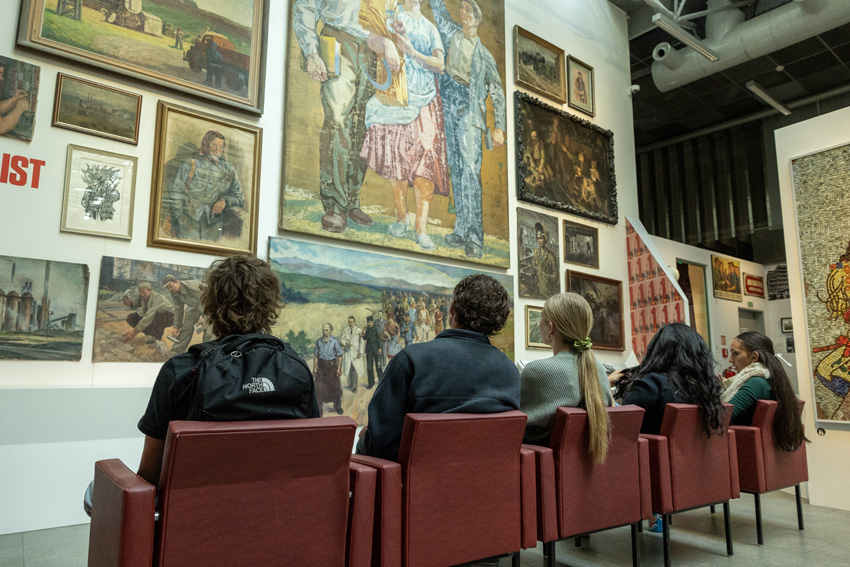In the year 1929, life seemed fairly prosperous and stable. Many people were confident and, for the most part, secure in their finances.
A few weeks later struck the most severe market crash to ever hit America: the Great Depression.
This event, coupled with numerous others, brought turmoil to millions of Americans. The Great Depression affected the nation, and continues to do so even to this day.
Alive during the Great Depression, 88-year-old Eleanor Edde, a resident at Sunrise Assisted Living, recalls the hunger of citizens around her who resorted to eating domesticated animals, and reflects on the satisfactory state her family was left in.
“We were not as bad off as most people during the Great Depression,” Edde said. “We had our own cow and our own pigs to butcher. We also had chickens. Because we had plenty of food, naturally we did not suffer too much. But there were some who were so hungry they ate dogs. They were starving. If you had food, you shared.”
Similar to Edde, Chester Johnson of Sunrise was 9-years-old when the Depression hit. Coming from a rather poor family, Johnson worried about the image he portrayed to his wealthier friends.
“The Depression affected me because it depended on what image you wanted to make to your contemporaries,” Johnson said. “In junior high school, some people could afford to buy store-bought paper bags to hold their lunch. Our family had to use leftover newspapers. It made a pretty good impression on what you were. I can’t explain how it affected you, but it did in a subtle sort of way. You felt insecure around your friends if you had less.”
Like Johnson, 96-year-old Isabel Brown, also a Sunrise Senior Living resident, was about 9-years-old when the Depression hit. Throughout the economic downturn, her family never asked for a dime of welfare. However, she remembers others who were under so much financial stress that they committed suicide.
“The big crash didn’t make a difference to us because we lived out in the country and farmed,” Brown said. “There was a lot of people, not just in our hometown but around the world, who were stepping out of windows. They lost everything they had.”
AcaDec studies focus on period
On campus, the Academic Decathlon (AcaDec) team has been studying the Great Depression since the school year started.
After learning about aspects of the event, senior Ricky Lopez, Honors-level AcaDec member, has become enlightened to its consequences.
“After learning what people went through during the Great Depression, I feel very lucky that I did not live during that time period,” Lopez said. “I know that I will never feel the emotional trauma that these people went through, but I do feel that I have an understanding of what these people experienced.”
To better understand the Great Depression, AcaDec students read The Grapes of Wrath by John Steinbeck. In the novel, Steinbeck depicts thousands of hungry people desperately searching for food and land.
Chapter 19 of The Grapes of Wrath includes this illustration: “They streamed over the mountains, hungry and restless — restless as ants, scurrying to find work to do — to lift, to push, to pull, to pick, to cut — anything, any burden to bear, for food. The kids are hungry. We got no place to live. Like ants scurrying for work, for food, and most of all for land.”
With millions facing unemployment in the past few years, some citizens may think the country is in a second Great Depression. Based on her experience, Brown suspects that current lifestyles may bring the country into another difficult period.
“I’ll tell you the trouble with people today is that everyone wants everything today, not tomorrow,” Brown said. “A lot of people get themselves into a mess because they buy things they can’t pay for. In my time, we never asked for anything we knew we could not pay for. But that was a different lifestyle; that was a long time ago.”
Although he is uncertain about the current condition of the economy, sophomore Brandon McCormick believes that reflecting on history gives greater perspective on the present.
“We can learn from what happened in the past so we don’t get into the same troubles in the future,” McCormick said. “We won’t make the same mistakes nowadays if we learn from the mistakes of the Great Depression.”
For more information on AcaDec and the Great Depression, read the Oct. 7 article, AcaDec investigates Great Depression.






